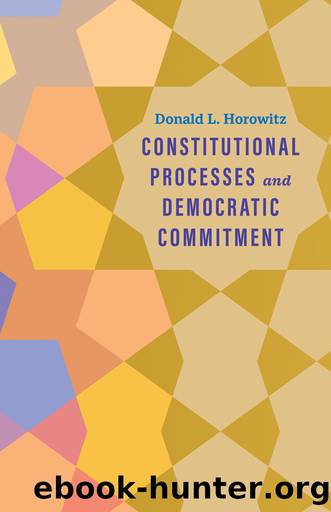Constitutional Processes and Democratic Commitment by Donald L. Horowitz;

Author:Donald L. Horowitz;
Language: eng
Format: epub
Publisher: Yale University Press
Published: 2021-10-15T00:00:00+00:00
CHAPTER 7
External Advice and the Participation Imperative
Many forces combined to propel the increase in external advice in democratization and constitutional renovation. The proliferation of newly independent countries after World War II; promotion of human rights by the United States and other Western governments beginning in the late 1970s;1 the interest of the United Nations in mitigating conflict and genocide; the concern of the World Bank with the rule of law and anti-corruption measures in order to facilitate international investment and economic growth; an array of NGOs dedicated to improving international regimes regulating environmental, humanitarian, or other transnational problems: these and similar state and nonstate actors helped to create networks or âepistemic communitiesâ working across borders and engaged in âprescriptive discourse.â2 With the Third Wave of Democratization, new networks and new organizations began to discuss standards and norms and to prescribe new norms, even âfundamental principles,â3 concerning rights, governmental structures, legal regulation, and constitutional processes. Of course, the diversity of legal and political systemsânot to mention particular circumstances and events that trigger decision pointsâdefies the application of standardized principles, and third-party experts, whether engaged through organizations or individually, encounter domestic clients who must assess the advice they receive and forecast its likely impact and desirability.
The Third Wave ushered in a succeeding wave of foreign experts crossing oceans to counsel constitutional reformers. The American Bar Association created the Central and Eastern Europe Law Initiative, which sent many lawyers and judges to that region. For example, the professor of American constitutional law Herman Schwartz chaired a group of twenty-five experts who worked in Czechoslovakia before its dissolution. Some such foreign experts were quite bold in their proposals. In Bulgaria, a complete draft submitted by a representative of the U.S. Chamber of Commerce was, unsurprisingly, modeled on the United States Constitution. Ethnocentrism is to be expected in such projects. If experts arrive with little knowledge of the country in which they must work, they may carry clauses of the constitutions with which they are familiar, to dispense as needed.4 Provision merchants of this kind were not and are not confined to those traveling from American shores.
There is less missionary boldness in constitutional advice today than in the heady days after 1989. On the whole, there is more expertise about the countries to which numerous foreign NGOs send staff than there was thenâalthough this is variableâand there is more reluctance to prescribe whole constitutions a priori or even specific provisions on a wholesale (as opposed to an interstitial) basis. There are, however, a few general rules of the constitution-making enterprise that are widely shared in the international NGO community that has emerged in recent decades. These rules are very frequently, nearly universally, advocated. Some have to do with what is regarded as the standard equipment of democracy, while many others concern constitutional process rather than content.
In constitutional processes, a paradigm case was the making of the South African constitution, in which a âglobalizing constitutionalismâ encountered the commitments of a liberation movement and produced some significant compromises.
Download
This site does not store any files on its server. We only index and link to content provided by other sites. Please contact the content providers to delete copyright contents if any and email us, we'll remove relevant links or contents immediately.
What's Done in Darkness by Kayla Perrin(25500)
Shot Through the Heart: DI Grace Fisher 2 by Isabelle Grey(18219)
Shot Through the Heart by Mercy Celeste(18160)
The Fifty Shades Trilogy & Grey by E L James(17774)
The 3rd Cycle of the Betrayed Series Collection: Extremely Controversial Historical Thrillers (Betrayed Series Boxed set) by McCray Carolyn(13189)
The Subtle Art of Not Giving a F*ck by Mark Manson(12912)
Scorched Earth by Nick Kyme(11832)
Stepbrother Stories 2 - 21 Taboo Story Collection (Brother Sister Stepbrother Stepsister Taboo Pseudo Incest Family Virgin Creampie Pregnant Forced Pregnancy Breeding) by Roxi Harding(11040)
Drei Generationen auf dem Jakobsweg by Stein Pia(10217)
Suna by Ziefle Pia(10186)
Scythe by Neal Shusterman(9259)
International Relations from the Global South; Worlds of Difference; First Edition by Arlene B. Tickner & Karen Smith(8608)
Successful Proposal Strategies for Small Businesses: Using Knowledge Management ot Win Govenment, Private Sector, and International Contracts 3rd Edition by Robert Frey(8419)
This is Going to Hurt by Adam Kay(7695)
Dirty Filthy Fix: A Fixed Trilogy Novella by Laurelin Paige(6453)
He Loves Me...KNOT by RC Boldt(5804)
How to Make Love to a Negro Without Getting Tired by Dany LaFerrière(5378)
Interdimensional Brothel by F4U(5304)
Thankful For Her by Alexa Riley(5161)
